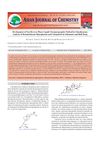
Three Indian medicinal plant compounds help hair growth.
 January 2012 in “Elsevier eBooks”
January 2012 in “Elsevier eBooks” Hair loss can cause emotional and social issues, and various treatments, including medication, surgery, and psychological support, are needed.
 November 2020 in “Postepy Dermatologii I Alergologii”
November 2020 in “Postepy Dermatologii I Alergologii” Sulfotransferase SULT1A1 activity may predict minoxidil treatment success for hair loss.
 92 citations,
September 2015 in “Journal of Lipid Research”
92 citations,
September 2015 in “Journal of Lipid Research” Skin fat helps with body temperature control and has other active roles in health.
 32 citations,
September 2017 in “Journal of the American Academy of Dermatology”
32 citations,
September 2017 in “Journal of the American Academy of Dermatology” Oral isotretinoin effectively treats yellow facial papules in frontal fibrosing alopecia patients.
 19 citations,
July 2015 in “Journal of Ginseng Research”
19 citations,
July 2015 in “Journal of Ginseng Research” Korean Red Ginseng may protect against hair loss caused by chemotherapy.
 18 citations,
March 2008 in “British Journal of Dermatology”
18 citations,
March 2008 in “British Journal of Dermatology” Finasteride works better for hair loss in patients 26 or younger.
 12 citations,
July 2014 in “Journal of Investigative Dermatology”
12 citations,
July 2014 in “Journal of Investigative Dermatology” Chemotherapy causes complex changes in hair follicle cells that can lead to hair loss.
 7 citations,
November 2009 in “Journal of the American Geriatrics Society”
7 citations,
November 2009 in “Journal of the American Geriatrics Society” Finasteride may help reduce inappropriate sexual behaviors in dementia patients with prostate issues.
 6 citations,
October 1997 in “CNS Drugs”
6 citations,
October 1997 in “CNS Drugs” Psychotropic drugs can cause hair loss or excessive hair growth.
 2 citations,
December 2019 in “Neurobiology of Stress”
2 citations,
December 2019 in “Neurobiology of Stress” Changing allopregnanolone levels in baby rats affects their adult behavior and alcohol use.
 March 2024 in “PLoS medicine”
March 2024 in “PLoS medicine” Physical activity, height, and smoking affect prostate cancer risk.
 January 2024 in “Dermatology practical & conceptual”
January 2024 in “Dermatology practical & conceptual” Atopic dermatitis in kids with alopecia areata can predict poor response to topical immunotherapy.
 85 citations,
March 2012 in “Revista Brasileira de Farmacognosia”
85 citations,
March 2012 in “Revista Brasileira de Farmacognosia” The genus Sophora has compounds with potential health benefits and could lead to new drugs, but more research is needed to understand their effects and safety.
 35 citations,
January 2018 in “Skin pharmacology and physiology”
35 citations,
January 2018 in “Skin pharmacology and physiology” Nanoemulsion creams with certain enhancers can greatly increase caffeine delivery through skin.

Human hair keratins can self-assemble and support cell growth, useful for biomedical applications.
 116 citations,
December 2013 in “European journal of endocrinology”
116 citations,
December 2013 in “European journal of endocrinology” Combining liraglutide and metformin helps obese women with PCOS who didn't lose weight on metformin alone to lose more weight.
 91 citations,
December 2010 in “Stem Cells”
91 citations,
December 2010 in “Stem Cells” Wnt signaling helps control how brain stem cells divide and is important for brain repair after injury.
 78 citations,
April 1994 in “Archives of dermatology”
78 citations,
April 1994 in “Archives of dermatology” The study found that Keratosis Pilaris Atrophicans is a genetic skin condition that starts in childhood, involves inflammation and scarring, and current treatments are only somewhat effective.
 28 citations,
September 2019 in “International Journal of Nanomedicine”
28 citations,
September 2019 in “International Journal of Nanomedicine” Minoxidil nanoparticles can potentially be a more effective treatment for hair growth than current treatments.
 5 citations,
January 2014 in “Asian Journal of Chemistry”
5 citations,
January 2014 in “Asian Journal of Chemistry” Researchers developed a quick and reliable method to test for betamethasone dipropionate and calcipotriol in ointments and drugs.
 4 citations,
March 2020 in “Cutaneous and ocular toxicology”
4 citations,
March 2020 in “Cutaneous and ocular toxicology” Wen by Chaz Dean Sweet Almond Mint Cleansing Conditioner is better tolerated than salicylic acid and baby shampoos.

Glycyrrhizic acid and licorice extract can significantly reduce unwanted hair growth.
 29 citations,
February 2016 in “Scandinavian journal of urology”
29 citations,
February 2016 in “Scandinavian journal of urology” Late puberty may slightly lower prostate cancer risk, baldness is not linked to overall risk but less so with aggressive types, ibuprofen use may increase risk, and vitamins show no effect on risk.
 21 citations,
November 2022 in “Frontiers in immunology”
21 citations,
November 2022 in “Frontiers in immunology” Sebaceous glands play a key role in skin health, immunity, and various skin diseases.
![Discovery of 7-Methoxy-6-[4-(4-Methyl-1,3-Thiazol-2-yl)-1H-Imidazol-5-yl]-1,3-Benzothiazole (TASP0382088): A Potent and Selective Transforming Growth Factor-β Type I Receptor Inhibitor as a Topical Drug for Alopecia](/images/research/9620bd26-3366-4f2a-bcac-f511697bbc41/small/35997.jpg) 6 citations,
January 2013 in “Chemical & pharmaceutical bulletin/Chemical and pharmaceutical bulletin”
6 citations,
January 2013 in “Chemical & pharmaceutical bulletin/Chemical and pharmaceutical bulletin” A new compound shows promise as a topical treatment for hair loss.
 6 citations,
November 2007 in “British Journal of Dermatology”
6 citations,
November 2007 in “British Journal of Dermatology” Fulvestrant solution doesn't help hair loss in men and postmenopausal women.
2 citations,
September 2014 in “Nature reviews. Drug discover/Nature reviews. Drug discovery” Specific immune cells cause alopecia areata and blocking certain proteins can prevent it.
20 citations,
March 2021 in “Drug design, development and therapy” Topical immunotherapy can treat alopecia areata, but its effectiveness varies and the exact mechanism is unclear.
 24 citations,
February 1987 in “Drugs”
24 citations,
February 1987 in “Drugs” Minoxidil promotes hair regrowth, but more research needed for effectiveness and response factors.


























![Discovery of 7-Methoxy-6-[4-(4-Methyl-1,3-Thiazol-2-yl)-1H-Imidazol-5-yl]-1,3-Benzothiazole (TASP0382088): A Potent and Selective Transforming Growth Factor-β Type I Receptor Inhibitor as a Topical Drug for Alopecia](/images/research/9620bd26-3366-4f2a-bcac-f511697bbc41/small/35997.jpg)

